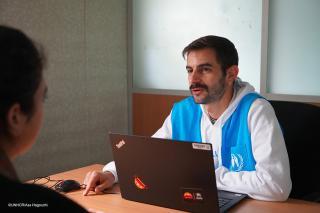Luis Moreno Cabrales (Spain) is a UN Volunteer Associate Refugee Status Determination Officer serving with the United Nations Refugee Agency (UNHCR) in Rabat, Morocco. As a social worker, Luis has been dedicated to refugees throughout almost all of his professional life, not only in Spain for the National Reception System for applicants and beneficiaries of international protection, but also abroad. His assignment is fully funded by the Government of Spain.
My role on a day-to-day basis consists of helping asylum seekers to substantiate their applications. This comprises interviewing asylum seekers in Morocco to find out why they request international protection and, based on their statements, evaluating their case to make a recommendation on whether their application should be accepted.
Mine is a very interesting assignment. On the one hand, because I have the opportunity to listen to incredible life stories, marked by much suffering and injustice, but also by the courage, tenacity and dignity of these people whom I deeply admire and respect. On the other hand, this work allows me to know the situation of many countries, their culture, their way of life and the conflicts they are going through. I have the impression of having traveled to many countries without leaving my office.
Through the interview, I try to create a suitable climate so that asylum seekers can remember their entire story and give me as much detail as possible about what they have experienced. I also try to elucidate the parts of their story that are less clear or need more detail. This is the hardest part, but also the one I like the most.
I must indeed listen to very painful experiences that I do not wish anyone to have. Yet these people trust me to tell me their stories, which surely, they have not shared with many people, even those close to them. It is an opportunity for them to let out what they have suppressed inside and start anew. It is also an opportunity for them to be listened to with respect, because their story deserves to be heard. -- Luis Moreno Cabrales, UN Volunteer Associate Refugee Status Determination Officer with UNHCR, Morocco
Subsequently, I do a complete analysis to prove or the credibility of their story, highlight the pieces of evidence that I was able to find, and analyze the situation in their country of origin to explain why they cannot come back.
Since the start of my UN Volunteer assignment, I have conducted 122 interviews with people of more than 12 nationalities, with different profiles: LGBT, political dissidents, victims of ethnic conflicts, people fleeing armed conflicts and unaccompanied minors. I have made 98 recommendations on the status of these people. Those who I have supported in gaining recognition of refugee status now enjoy legal security in Morocco and the support of UNHCR's protection services.
UN Volunteers are often asked to define what volunteering means to them in one word. I always say it's a win-win situation. On the one hand, I feel useful – I have been able to contribute with my experience and my knowledge to this cause. On the other hand, I have learned a lot and I have lived human experiences that have greatly enriched me. -- Luis Moreno Cabrales
The people I meet every day are an inspiration to move forward and know that human beings can overcome many situations. It has also helped me be aware of the injustice that exists in many parts of the world and motivated me to continue fighting for a more just world.

On one occasion, I conducted an interview with an asylum seeker who demanded a lot of tact and patience, since it was the first time in his life that this person had talked to someone about his sexual orientation. At the end of the interview, he told me: "I always thought it was normal for people to hate me and treat me badly for being the way I am. But today, you have listened to me with respect and care, and I have realized that it is not normal for people to hate me and maltreat me for being who I am. I give you the medal to the first person who has treated me with respect in life."
That invisible medal that this refugee gave me is the best reward I could get from this volunteering experience.

